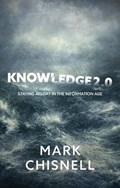Our access to knowledge is extraordinary, much of it available through a smartphone that rarely leaves our side. The problem is no longer finding information; it's sifting it for the good stuff. Facts are often distorted by laziness or incompetence, and truths are sometimes twisted or hidden for financial gain, or to evade the consequences of mistakes or failures.
It doesn't help that we – as human beings – have trouble discerning truth from untruth, and fact from fiction. There is a powerful personal component to what we carry around with us in our heads and call knowledge. We process and generate information with a set of unique experiences and biases, but we all have traits that can predispose us to error.
This is a user's guide on how to navigate this new world of knowledge. This book explores both across six types of knowledge that are vital to staying afloat in the 21st century:
Narrative – story is the single most powerful form of knowledge and that alone makes it both incredibly useful and incredibly dangerous.
Confidence – knowing the limits of our knowledge is central to using that knowledge effectively.
Prediction – if we had perfect knowledge of the future, we'd be very wealthy and very safe.
Science – scientific knowledge is ubiquitous in modern life, it's crucial to understand the processes that generate it.
Chance – randomness controls a frightening amount of our lives, much more than many of us understand.
Problem solving — no one's going to stay afloat in the Information Age unless they can fill knowledge gaps and find solutions.
This is a book about understanding that our knowledge of the world can only ever approximate what's really out there, and using that insight to make good decisions for ourselves and our families about everything from jobs to healthcare and personal finance.
Reviews
'Mark Chisnell's fascinating book uses racing and sailing triumphs and tragedies… to analyse human behaviour, decision making and problem solving, offering insight into the best way we can use the knowledge we have to react to a given situation... An insightful read for sailors and non-sailors alike.'
PBO
"The author formulates a kind of popular epistemology that divides the various kinds of knowledge into six categories and then anatomizes the vices and virtues of each of them as sources of belief… His prose is unfailingly clear, and he illustrates his points with references to sailing… The best of his treatment is the appraisal of scientific authority."
Kirkus Reviews

